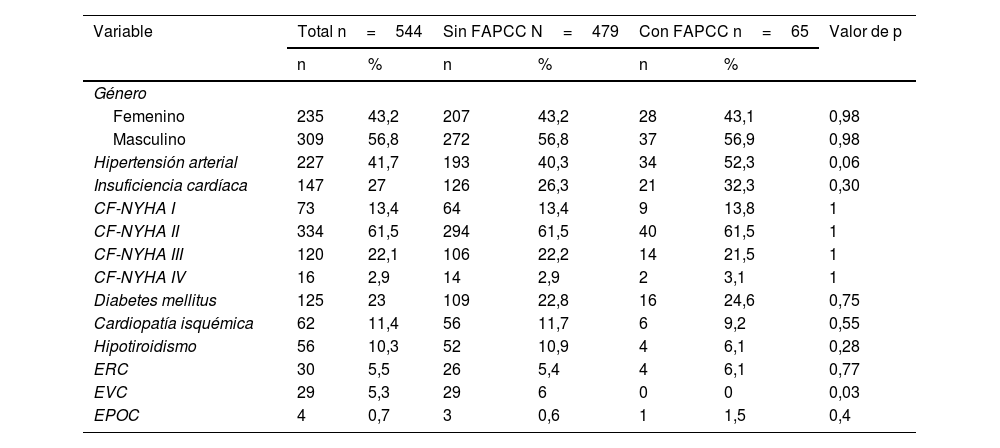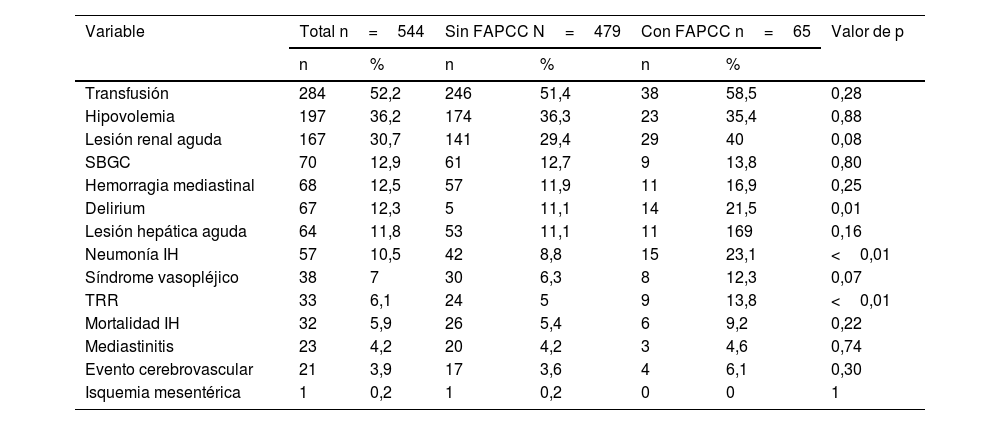A pesar de la innovación en las técnicas quirúrgicas y el soporte hemodinámico circulatorio, la fibrilación auricular sigue siendo una arritmia frecuente en los pacientes sometidos a cirugía cardíaca, y se ha vinculado a un aumento de las complicaciones en el período trans y postoperatorio, posicionándose como una de las 10 prioridades de investigación en cirugía cardiovascular.
MétodoEstudio observacional, analítico, retrospectivo llevado a cabo en el centro cardiovascular más grande de México. Se incluyeron pacientes adultos (>18 años) sin el antecedente de fibrilación auricular que fueron sometidos a cirugía cardíaca con circulación extracorpórea durante el 01 de enero del 2022 al 31 de diciembre del 2023. Se evaluaron las variables que se han correlacionado con la fibrilación auricular poscirugía cardíaca (FAPCC).
ResultadosSe incluyeron 544 pacientes. La incidencia de FAPCC fue del 11,9%. La mortalidad intrahospitalaria global fue del 5,9%. Hubo una diferencia significativa en la longevidad entre los pacientes que en el período postoperatorio presentaron fibrilación auricular y los que se mantuvieron en ritmo sinusal (62 versus 57 años; p≤0,01). Utilizando un modelo de regresión logística univariado, encontramos que la FAPCC predice de manera significativa el surgimiento de neumonía intrahospitalaria (OR: 3,12; IC 95%: 1,61-6,02; p≤0,01) y el requerimiento de terapia de reemplazo renal (OR: 3,04; IC 95%: 1,34-6,86; p≤0,01).
ConclusionesLa fibrilación auricular es una arritmia común en el postoperatorio de cirugía cardíaca con circulación extracorpórea, resultando en una característica de alto riesgo por su correlación con resultados adversos. La prevención, la detección temprana y el tratamiento de la FAPCC podrían tener implicaciones pronósticas.
Despite the latest innovations in surgical and cardiopulmonary bypass techniques, atrial fibrillation remains a common arrhythmia in patients undergoing heart surgery, and has been shown to increase the incidence of intra- and postoperative complications. For this reason, it is among the top 10 research topics in cardiovascular surgery.
MethodObservational, analytical, retrospective study carried out at the largest cardiovascular centre in Mexico. Adult patients (>18 years) with no history of atrial fibrillation who underwent heart surgery with cardiopulmonary bypas between 1 January 2022 and 31 December 2023 were included. Variables that have previously been correlated with postoperative atrial fibrillation (POAF) were evaluated.
ResultsA total of 544 patients were included. The incidence of POAF was 11.9%. Overall in-hospital mortality was 5.9%. There was a significant difference in age between patients that developed postoperative atrial fibrillation and those that maintained sinus rhythm (62 vs 57 years; p = ≤ 0.01). Using a univariate logistic regression model, we found that POAF significantly predicts the occurrence of hospital-acquired pneumonia (OR: 3.12; 95% CI: 1.61-6.02; P≤0.01) and the requirement for renal replacement therapy (OR: 3.04; 95% CI: 1.34-6.86; P≤0.01).
ConclusionsAtrial fibrillation is a common arrhythmia in the postoperative period of heart surgery with cardiopulmonary bypass, and is a predictor of adverse outcomes. Prevention, early detection and treatment of POAF may have prognostic implications.















